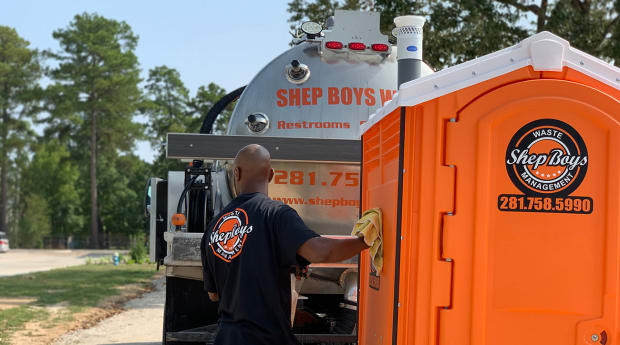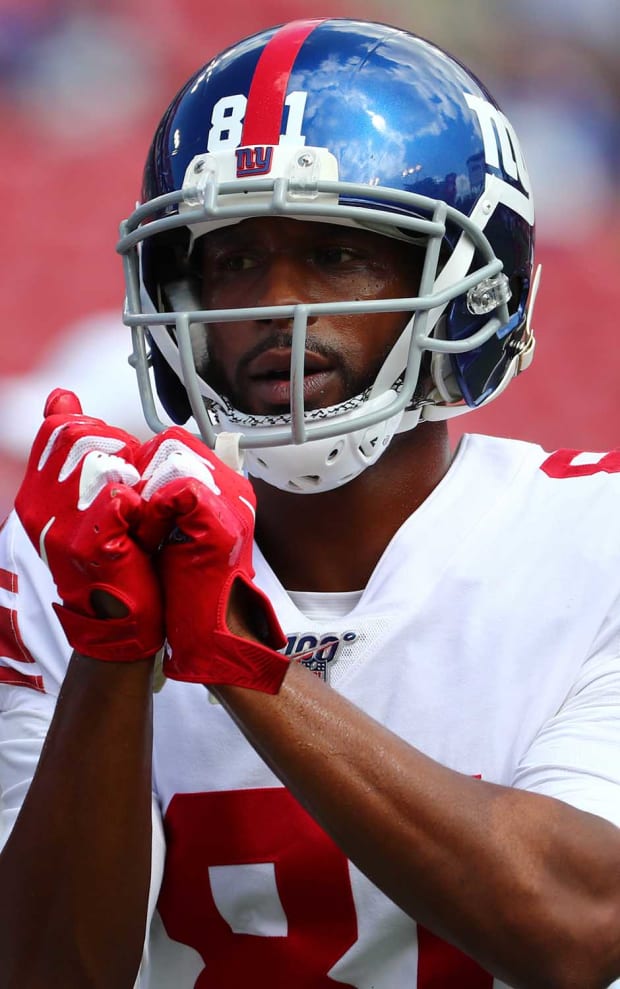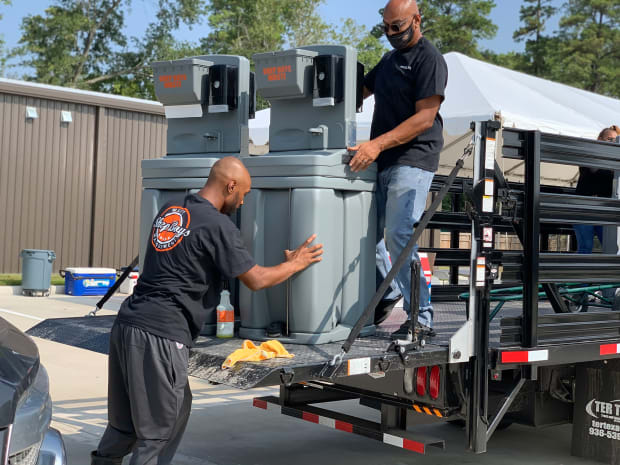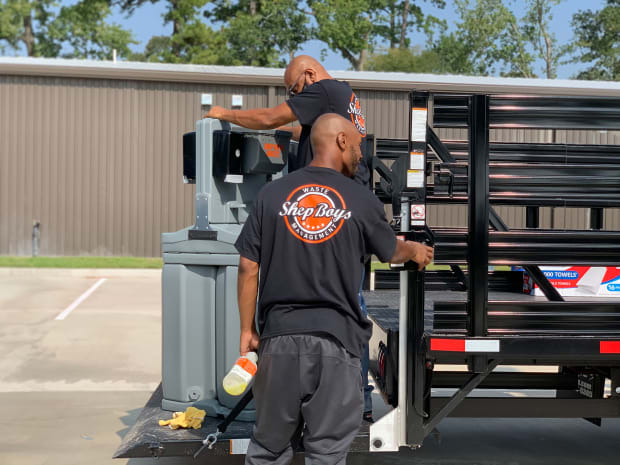After retiring at age 30, former NFL WR Russell Shepard is now CEO of his booming business, Shep Boys Waste Management.
It was midnight in Manhattan last November, and Russell Shepard Jr., a veteran wideout and special teams ace with the New York Giants, had just finished dinner with his wife, Marian, at Jue Lan Club, their favorite Chinese spot in Chelsea.
As their Uber driver chauffeured the Shepards home to their apartment in New Jersey, Russell tried to wrap his mind around what he was seeing on each city block: garbage, mounds and mounds of garbage. The next day was trash day, and the city’s waste— stuffed into black and clear plastic bags—awaited sanitation workers.
“I had never seen that much trash in my f---ing life,” he says.
Shepard, 30, knew tonnage. His grandfather and father drove dump trucks, and Shepard grew up playing in the back of them. Even as he suited up on Sundays in the NFL, he built a trucking business shortly after his rookie season. By his third year in the league, he made more money via that side venture than his NFL salary.

But to focus on the field, he entrusted the trucking enterprise to his parents, Russell Sr. and Nikki, and continued to monitor opportunities elsewhere. An avid investor, passive income flowed in steadily from multiple corners, and he regularly engaged teammates about possible collaborations. But now on injured reserve due to a foot sprain, he was eyeing potential off-ramps after seven seasons in the NFL. And when he returned to Manhattan for a doctor’s appointment the next morning, he marveled at how quickly and efficiently the garbage had been cleared.
Where others saw waste, Shepard saw a chance to grow his wealth. Last winter, he considered his retirement options. He had long planned to be an agent, but when he went to the NFL draft combine in Indianapolis last February, he was put off by the idea of babysitting players and the unsavory competitors.
Upon returning home to Houston, he asked his wife for her former boss’s phone number. Before she married Russell, Marian had worked in sales for Jon Farley, the CEO of Zters, a rapidly growing company that provides waste solutions to construction sites and commercial facilities across the country. After playing phone tag, Farley had lunch with Shepard at Peli Peli, a South African restaurant. Farley, 64, informed Shepard of a major flaw in the industry: Many of the suppliers were not regularly maintaining the cleanliness of their products, such as toilets at construction sites. Shepard grew intrigued, and asked more questions.
“You can’t be too full of yourself if you’re going to be in the garbage business or in the toilet business,” Farley said. “You have to be able to look people in the eye and say, yeah, well I’m a garbage man. It is a very demanding and intricate business, much more complicated than people know.”
Shepard was sold, and eight months later, he is flush with cash as the founder and proprietor of
Shep Boys Waste Management. Shortly after sitting with Farley, Shepard Jr. flew out to Charlotte with his parents, drove another 160 miles to Gretna, Va., and bought a vacuum truck with a 2,000-gallon tank, then returned home and purchased 125 portable toilets, 50 hand wash stations and 20 holding tanks, just as the country started to lockdown due to the coronavirus.
To house it all, he purchased just under two acres of land five minutes from his current house in Cypress, Texas, and 10 minutes from his childhood home. Shepard had no debt, so his bank cleared him for a nearly million-dollar credit line, and now, amid the pandemic, he is knee deep in requests for portable toilets equipped with hand sanitizer dispensers and ventilation fans from construction companies across greater Houston.
“[I’ve] seen it different than anybody else,” he said. “Everybody was like, Why would you start a company in a pandemic? And I’m like why not? It is going to be a new norm going forward and we can be one of the first companies to create it.”
In his first month, he covered his overhead, which was $6,000. In his second month, he made $12,000. By the third week of his third month, he brought in $25,000.
Each week, Shep Waste Management handles 3,000 gallons of human waste, and Shepard’s father is retiring from his trucking job at the end of 2020 to assist his son full time. Shepard did not just slap his name on the company—his days start at 4:20 a.m., and he knocks off at 8 p.m., after hours of scrubbing and manual labor.
“I’m in awe watching him walk out of them toilets wincing,” Russell Sr. said. “He has gone from sugar to s***!”
***
Life was always a long haul to the Shepards. Russell Jr.’s great grandfather was the first to get in on transporting when he carried pulpwood in East Texas and Louisiana. His son then slid behind the wheel of a dump truck before hitting the road for work. Sand, dirt and clay were his cargo, and he settled in Houston. Russell Sr., learned at his father’s side before following his path. Idling was not allowed, so Russell Jr. spent his youth washing trucks in the yard. But when his mom asked whether he would join the family business, he was adamant.
“Mommy, never,” he replied.
Russell Jr. shouldered his loads on the football field. At Cypress Ridge High, he was a dual-threat quarterback, the best in Texas in 2012, and accounted for 538 yards of total offense and six touchdowns in his final game. For his career, he finished with more than 8,000 yards of total offense and 98 touchdowns. It was all a blur by the end. Less than a month after his final game, his No. 10 was retired.
He followed his forefathers’ path back over the state line to Baton Rouge, where he started out as a quarterback with LSU. But he wound up playing wideout and running back, breaking off one touchdown run of 50 yards and leaving defenders behind on end arounds. Still, he got lost in the shuffle on the Tigers’ talented roster, and no NFL team valued him enough to draft in 2013.

As a free agent, Shepard earned a spot with the Buccaneers after spending camp with the Eagles and viewed his career as a game-to-game gambit. Not one pass was thrown his way that season, but he proved his worth on special teams as a resourceful coverage man. At season’s end, he started to explore post-football options, and his attitude toward trucking started to change. With part of his $391,000 salary, the league minimum, he purchased a used truck for $30,000, and he made all of his investment back in four months as he carried gravel, dirt, sand and glass between construction sites. After his second season, he bought two more trucks and hired a few drivers. After his third season, during which he was named a team captain and boasted 14 solo tackles on special teams—tied for best in the NFL—he purchased a house, got married and bought two more trucks. Then, his patience paid off. A receiver role opened up in October of the next year when Vincent Jackson tore his ACL. Coach Dirk Koetter knew which hands wanted the ball.
"He'd like to throw it, catch it, run with it, tackle it, kick it,” Koetter says. “Shep brings a certain presence."
He caught 23 balls, averaged 14 yards per reception and pounced on a payday when the Panthers offered him $4 million that winter. Thereon, he became obsessive about financial information. He saved, shed debt, leveraged his football celebrity, networked with financiers, attended symposiums put on by the NFLPA and researched various industries, such as real estate. When he entered the league, he had two goals: own a house and start his own company. With the new contract, he paid off his house’s mortgage and the loan for his red Mercedes Benz 350 GLK.
Following one year in Carolina, he jumped to the Giants because he declined to accept a pay cut. Throughout 2019, he went on an investment spree. He put $50,000 into a Walgreens location and $100,000 into another. He diversified his portfolio, investing in a gun range, grocery stores, a private airline and day care facilities. He also poured some funds into venture capital.
“You need to chill!” his wife said.
After being turned off by the agent game when he was at the combine, he pivoted his attention to waste and had his meeting with Farley. To that point, he was considering the dumpster part of the industry, but then he looked at vacuum trucks. His mother had worked in human resources and his father knew the transport business. Together, they made a business plan, marketed in Houston and started receiving inquiring calls two weeks before they planned to open in August.

One call came from Shepard’s agent, Brian Overstreet. It was a Friday in August, and the Ravens wanted to bring Shepard in for a workout. Shepard weighed his options once more, and readied to fly east for one last shot. But he couldn’t sleep the night before he was scheduled to depart. The next day, he called Overstreet and told him he was done.
Shepard officially retired a few weeks later. He recalled a talk he had with an old teammate during the pandemic. He declined to name the player, but noted he was closing in on $70 million in career earnings.
“I was telling him, man, I’m kind of tired of the game, not really enjoying it,” says Shepard, who made less than $10 million in the NFL. “He said, ‘Man, Shep, you can do that with your lifestyle.’ It will always stick with me, he said, ‘I can’t afford to stop playing. I’ve got too many bills right now.’ Again, he had over $70 million in career earnings.”
***
On a brilliant Saturday in September, Shepard brought his wife and parents to a parking lot in Cypress, where a white tent was set up. Farley, the Zters CEO, was unveiling his new headquarters, shortly after being named to Inc. 5000 fastest-growing private companies list, and he invited Shepard, now a preferred vendor.
It was an opportunity for Farley’s salespeople to see how to work the equipment they pitch to potential clients, and Shepard, wearing work boots, showcased hand-wash stations and portable toilets alongside Farley’s dumpsters.

“He was showing people the benefits of his toilets over anybody else’s,” Farley says. “I see his toilets all around. It’s a pretty nice thing.”
They are hard to miss. Shepard remembered a lecturer at an NFLPA business academy explaining that orange was a vibrant color and caught eyes. Shepard filed that away, and now sees his orange toilets from afar, knowing they dot the Texas landscape, from construction sites on interstates to AutoZones under renovation.
He wondered how many more portable toilets he needed. Recently, he decided he would buy another truck and order 250 more units in January.
“I’m on edge thinking, like, how can I grow this but not too fast?” he says.





0 Comments